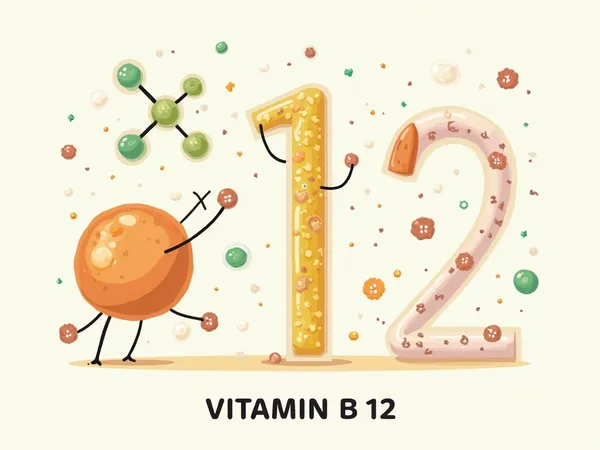
Ready to Start Your Wellness Journey?
Become a Herbalife Preferred Member and enjoy exclusive discounts of up to 25% on all products.
BECOME A PREFERRED MEMBERVitamin B12 Benefits: A Science Based Guide to Wellness
Disclaimer: This article is for informational purposes only and should not be considered medical advice. Always consult a healthcare professional or a registered dietitian before making significant changes to your diet or starting any supplementation.
Introduction
Vitamin B12, also known as cobalamin, is a water-soluble vitamin involved in several physiological processes, including red blood cell formation and neurological function. Deficiency can occur in certain populations. Understanding its roles, sources, and intake recommendations may help maintain adequate levels and prevent complications associated with deficiency.
Role in the Body
Specific Functions
Vitamin B12 contributes to multiple biochemical pathways:
• DNA Synthesis and Cell Division
Vitamin B12 supports the conversion of homocysteine to methionine, a reaction important for DNA methylation and replication in rapidly dividing tissues.
• Red Blood Cell Formation
Adequate B12 is necessary for normal erythroid precursor cell development, helping to prevent megaloblastic anemia.
• Neurological Function
Cobalamin is required for myelin maintenance, which supports nerve impulse transmission and may influence mood and coordination.
• Energy Metabolism
Vitamin B12 acts as a cofactor for enzymes involved in the breakdown of fatty acids and amino acids, participating in cellular energy production.
Effects of Deficiency
Insufficient Vitamin B12 can affect various systems. Documented signs and complications include:
• Megaloblastic Anemia
Deficiency impairs DNA synthesis in red blood cell precursors, leading to enlarged cells and reduced oxygen transport, which can cause fatigue and weakness.
• Neurological Issues
Peripheral neuropathy (numbness, tingling), gait disturbances, and cognitive symptoms may arise due to impaired myelin maintenance.
• Cognitive Impairment
Some studies suggest low B12 status is associated with cognitive decline, though causality remains under investigation.
• Elevated Homocysteine Levels
Reduced B12 can lead to higher homocysteine, which is considered a cardiovascular risk factor.
Dietary Sources
Best Food Sources
Vitamin B12 occurs naturally in animal-derived foods. Approximate contributions to the Recommended Dietary Allowance (RDA) per 100 g of food (U.S. values) are:
• Shellfish (clams, oysters, mussels): very high (several times the RDA)
• Fish (salmon, trout, tuna): moderate to high (around 50–80% RDA)
• Red Meat (beef, lamb): moderate (30–50% RDA)
• Poultry (chicken, turkey): lower to moderate (10–20% RDA)
• Eggs (mainly yolk): about 10% RDA per large egg
• Dairy Products (milk, cheese, yogurt): 10–25% RDA per serving
Supplementation
Supplementation or fortified foods may be advised for:
• Vegetarian or Vegan Diets
Plant-based diets do not provide reliable natural B12; fortified foods or supplements are recommended.
• Older Adults
Age-related changes in stomach acid and intrinsic factor can reduce B12 absorption; oral supplementation may be beneficial.
• Pernicious Anemia
An autoimmune condition that impairs intrinsic factor production; intramuscular or high-dose oral B12 is often used.
• Gastrointestinal Disorders
Conditions such as celiac disease, Crohn’s disease, or bariatric surgery can affect absorption; monitoring and supplementation are advised.
Health Benefits
Adequate Vitamin B12 intake supports various aspects of health, as suggested by current research:
• Energy Metabolism
By serving as a cofactor in metabolic reactions, B12 contributes to normal energy-yielding processes.
• Cognitive Health
Observational studies have linked low B12 status to poorer performance on memory and processing speed tests; further research is ongoing.
• Cardiovascular Factors
Vitamin B12 helps maintain homocysteine within normal ranges; elevated homocysteine is considered a risk marker for cardiovascular disease.
• Nervous System Maintenance
B12 is involved in myelin integrity and neurotransmitter synthesis; deficiency may contribute to neuropathic symptoms.
• Pregnancy Support
Adequate B12 alongside folate is important for fetal development; low maternal B12 status has been associated with higher risk of neural tube defects in some studies.
Daily Requirements
Recommended Dietary Allowances (RDAs) from the U.S. National Institutes of Health:
• Infants 0–6 months: 0.4 mcg/day
• Infants 7–12 months: 0.5 mcg/day
• Children 1–3 years: 0.9 mcg/day
• Children 4–8 years: 1.2 mcg/day
• Children 9–13 years: 1.8 mcg/day
• Adolescents 14–18 years: 2.4 mcg/day
• Adults 19+ years: 2.4 mcg/day
• Pregnant women: 2.6 mcg/day
• Breastfeeding women: 2.8 mcg/day
Individual needs may vary based on absorption, diet, and health conditions. Blood tests can guide personalized recommendations.
Tips for Incorporation
Strategies to include Vitamin B12 in your diet:
• Diversify Protein Sources
Rotate fish, poultry, lean meats, eggs, and dairy to meet B12 goals.
• Fortified Foods
Use B12-fortified plant milks, cereals, or nutritional yeast if avoiding animal products.
• Meal Planning
Aim for at least two servings of B12-containing foods daily, such as yogurt at breakfast and fish at dinner.
• Cooking Methods
Short cooking times and lower temperatures (steaming, poaching) may better preserve B12 content than prolonged high heat.
• Supplement Selection
If supplementing, methylcobalamin or cyanocobalamin forms are commonly used. Follow label dosing or professional guidance.
• Regular Screening
Consider annual or biennial B12 level checks if you are over 50 or have risk factors for deficiency.
Conclusion and Call to Action
Vitamin B12 plays essential roles in hematologic, neurological, and metabolic functions. Maintaining adequate intake through diet, fortified foods, or supplements can help prevent deficiency and support overall health. If you have risk factors for low B12, discuss testing and supplementation options with a healthcare professional.
Ensure your Vitamin B12 intake aligns with evidence-based guidelines to support your health goals.
Ready to Start Your Wellness Journey?
Become a Herbalife Preferred Member and enjoy exclusive discounts of up to 25% on all products.
BECOME A PREFERRED MEMBER